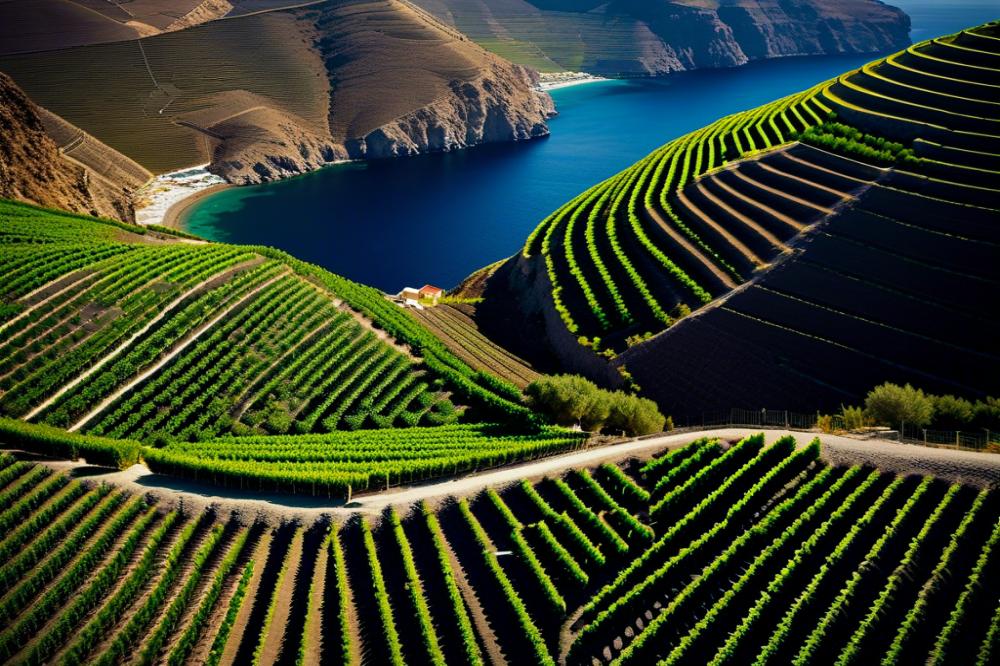A Guide to Enjoying Greek wines and Pairings
Greece is a country rich in history and culture. Its wines play a significant role in this vibrant culinary landscape. For centuries, Greeks have produced and enjoyed wines that reflect their traditions and the unique terroir of their regions. As travelers explore the beautiful landscapes of Greece, discovering local flavors becomes essential.
Greek wine varieties come from diverse regions, each boasting its own distinct characteristics. Notable among these are Assyrtiko and Xinomavro, two grape varieties that showcase the essence of Greek viticulture. Assyrtiko, with its crisp acidity and citrus notes, pairs beautifully with seafood, a staple of Mediterranean cuisine. On the other hand, Xinomavro, often compared to Barolo, offers dark fruit flavors and a hint of spice, making it an excellent companion for hearty dishes.
As people journey through the vineyards, wine tours provide an immersive experience. Visitors can sip on wines while learning about the winemaking process. Along the way, they may also encounter various food pairings that enhance the tasting experience. Wine and cheese are common companions, especially when indulging in local varieties that mirror the region’s unique flavors.
Traditions surrounding wine extend far beyond the glass. Each bottle tells a story of the land, climate, and the families who have nurtured the vines. Understanding these connections adds depth to the enjoyment of wine. Whether sampling a refreshing white or a bold red, travelers will find that the experience of tasting Greek wines is intertwined with the rich culinary heritage of Greece. Exploring these connections through wine makes one’s journey unforgettable.
Greek Wines

Greek wines hold a special place in the culture and history of Greece. For centuries, they have been intertwined with Greek traditions, celebrations, and everyday life. These wines are not just beverages; they tell stories of the land, people, and traditions. Each bottle reflects the geography and climate of the regions they come from.
Distinctive characteristics set Greek wines apart from those produced in other wine regions. The country is home to numerous indigenous grape varieties that thrive in its diverse landscapes. Assyrtiko, for example, comes from Santorini and is known for its crispness and mineral qualities. Xinomavro, on the other hand, is a red wine variety from northern Greece famous for its complex flavors and aging potential. Each grape variety carries unique tasting notes, enhancing the overall experience.
The Mediterranean climate plays a crucial role in the grapes’ development. Warm, sunny days and cooler nights create the perfect conditions for ripening. This climate contributes to the rich flavors and balanced acidity found in many Greek wines. Regions such as Nemea, Naoussa, and Crete showcase different microclimates that nurture various grape types, leading to a rich tapestry of flavors.
Food pairings enhance the enjoyment of Greek wines. Whether you are nibbling on olives with a glass of Assyrtiko or enjoying a hearty meal with Xinomavro, the right combination can elevate both the food and the wine. Greek cuisine, filled with fresh ingredients and vibrant flavors, complements these wines beautifully. A classic pairing is wine and cheese, where a sharp feta may work well with a crisp white, while a rich red could match perfectly with lamb dishes.
For those who wish to explore, wine tours offer an excellent opportunity to experience these wines firsthand. Visiting vineyards allows you to witness the winemaking process and understand the effort behind each bottle. Engaging with local winemakers provides insight into the traditions that have been preserved through generations. This immersion into Greek viticulture is a journey worth taking.
Greek wines are more than just drinks. They represent a cultural heritage that blends flavors, aromas, and creativity. With every sip, one can appreciate the artistry involved in their production and the joy they bring to life’s moments. Embracing Greek wines means embracing a part of Greece itself.
Greek wine varieties

Greek wine culture features a fascinating array of varieties. Two of the most widely known are Assyrtiko and Xinomavro. Let’s take a closer look at these remarkable offerings.
Assyrtiko
Assyrtiko hails from Santorini, one of Greece’s famous wine regions. This white grape variety thrives in volcanic soil. Its flavor profile is crisp and mineral-driven, often showing notes of citrus and green apple. Many lovers of Mediterranean cuisine enjoy pairing Assyrtiko with seafood and grilled vegetables. The wine’s bright acidity balances well with the rich flavors of these dishes.
Xinomavro
Xinomavro is often thought of as Greece’s answer to Pinot Noir. This red grape variety is primarily grown in regions like Naoussa and Amyndeon. Tasting notes reveal a robust profile, featuring dark cherry, plum, and earthy undertones. A hint of spice lingers in the palate. This wine pairs beautifully with hearty fare, such as lamb dishes or aged cheeses. Many visitors delight in exploring local tavernas to sample these combinations.
Discovering Lesser-Known Varieties
Venturing off the beaten path can lead to the discovery of lesser-known Greek wine varieties. For instance, the grape Agiorgitiko is native to the Nemea region. It’s known for its smooth tannins and fruity flavors, making it great for red-sauce pasta or a robust pizza.
Another intriguing option is the white grape Moschofilero. It is light and aromatic, featuring floral notes and citrus zest. This delightful wine pairs nicely with light appetizers or a cheese plate. Many visitors on wine tours find such wines offer delightful surprises away from mainstream choices.
With each sip, you engage with Greek traditions woven into these varieties. Selecting different wines during meals can enhance your experience. Exploring these options can elevate not just your meal but your understanding of the culture.
Wine Regions of Greece

Santorini
Santorini is famous for its stunning white landscapes and volcanic soil. The island’s unique terroir plays a crucial role in shaping the local wines. Assyrtiko, a primary grape variety here, thrives in the arid climate and rocky terrain. This grape produces white wines with crisp acidity and mineral notes, making them perfect for pairing with seafood and Mediterranean cuisine. For a memorable experience, visit wineries like Santo Wines or Venetsanos Winery, where you can taste exquisite wines while enjoying breathtaking views of the caldera.
Naoussa
Naoussa is located in northern Greece and is known for its red wines. Xinomavro is the star grape variety in this region. It is celebrated for its complex flavors and aging potential. The climate is influenced by both the Adriatic Sea and the surrounding mountains, providing a unique balance of warmth and cool breezes. Tasting notes often highlight dark fruit, herbs, and spices. A visit to Boutari or Kir Yianni wineries allows wine lovers to delve deeply into the region’s rich history and captivating flavors.
Crete
Crete, the largest island in Greece, boasts diverse microclimates and fertile soils. Many indigenous grape varieties flourish here, like Liatiko and Vidiano. The Mediterranean climate contributes to wines that have ripe fruit flavors and balanced acidity. Cretan wines pair nicely with local dishes, making them a staple of Greek traditions. Wine tours around the island can reveal hidden gems such as Lyrarakis Winery or Douloufakis Winery. Don’t miss the chance to sample local cheese alongside these delightful wines, as the combinations can be extraordinary.
Food Pairings with Greek Wines

The art of pairing food with wines is delightful, especially when exploring Greek flavors. Traditional dishes from this Mediterranean region shine when matched with the right wine. Understanding some basics can enhance your dining experience significantly.
Assyrtiko, one of the prominent white wine varieties, pairs wonderfully with seafood. Grilled octopus drizzled with olive oil and lemon finds a delicious companion in this crisp wine. Its citrusy and mineral notes complement the dish, creating a balanced taste.
Xinomavro offers a different experience. This robust red can tackle hearty meals beautifully. Try it with lamb, especially if prepared with herbs and garlic. The complex flavors of Xinomavro enhance the savory notes of the lamb, resulting in a fantastic combination.
Appetizers and Snacks
When it comes to snacks, Greek wine paired with cheese is a treat. A light feta cheese with olives is delightful with a chilled Assyrtiko. The briny flavor of the cheese aligns perfectly with the wine’s refreshing acidity. Meanwhile, for a more unique adventure, pair Xinomavro with aged kasseri cheese. This combination brings out the rich, nutty undertones of the cheese beautifully.
Meze platters also offer a variety of tastes. Include tzatziki, grilled vegetables, and dolmades. These dishes work well with Assyrtiko, creating a refreshing pairing. The wine’s minerality lifts the flavors of these appetizers, enhancing the whole experience.
Main Courses
Main courses deserve equal attention. For a classic Greek moussaka, choose a fuller-bodied red like Xinomavro. Its depth will match the layers of flavors in this dish, especially the richness of the béchamel sauce. Another option for meat lovers is to pair a strong red with kleftiko, a traditional lamb dish. Here, the wine balances the richness of the meal.
Vegetarian options also thrive with the right wine selections. For a dish like spanakopita, the delightful savory spinach pie works wonderfully with Assyrtiko. Its bright acidity cuts through the flaky pastry, enhancing the overall flavor.
Exploring Greek wine regions during your meals can also be enlightening. Regions such as Santorini are recognized for their unique white wines. When enjoying these, consider their natural pairings with regional dishes. This approach reflects Greek traditions and emphasizes the connection between their food and wine.
Wine tours in Greece often highlight these pairings. Learning about local varieties and regional specialties can deepen your appreciation of both food and wine. The tastings give an opportunity to discover how different wines interact with traditional recipes.
Tasting Notes and Experience
When embarking on a wine tasting journey, prepare your senses for an engaging experience. Greek wine varieties offer a delightful exploration of flavors, scents, and traditions. Begin your tasting by observing the wine’s color. Tilt the glass slightly and look for clarity and depth. The hues can range from pale yellow in Assyrtiko to deep ruby in Xinomavro.
Aroma plays a crucial role in evaluating a wine. Swirl the glass gently, allowing the wine to oxygenate. Take a moment to inhale deeply. Expect to detect fruity notes, floral hints, and perhaps a spicy undertone. For instance, Assyrtiko may present citrus and mineral fragrances, while Xinomavro can unveil dark cherry and herbal qualities.
Next, take a small sip. Let the wine rest on your palate for a few moments. Notice how it feels in your mouth. A good wine offers a balance of acidity, sweetness, and tannins. Assyrtiko usually has crisp acidity, making it refreshing, especially paired with Mediterranean cuisine. In contrast, Xinomavro’s tannins yield a bolder experience, best enjoyed alongside rich meats or hearty dishes.
Explore the texture of each sip. Some wines are silky, while others might feel robust or tannic. The finish is equally important. Do flavors linger, or do they fade quickly? A lasting finish often elevates the overall impression of the wine.
Consider food pairings as well. Greek traditions celebrate the harmony of wine and cheese, like feta or kasseri, which complement the vibrant notes of Assyrtiko. Dishes like moussaka or grilled lamb pair wonderfully with Xinomavro. Local wine tours frequently highlight these perfect combinations, showcasing the best of Greek culinary heritage.
Take notes as you explore each wine. Jot down your impressions on aroma, flavor, and pairing preferences. Writing enhances your experience and helps you remember the nuances of each variety. With practice, your palate will become more sensitive to different elements, leading to a greater appreciation for these exceptional wines.
Greek Wine and Cheese
Exploring the pairing of Greek wine and cheese opens a door to Mediterranean cuisine’s vibrant flavors. Greek wines offer a stunning variety of tastes that can complement an array of cheeses. Understanding these combinations can elevate any meal or gathering.
Assyrtiko, a crisp white wine from Santorini, shines when paired with Feta cheese. The saltiness of the Feta contrasts beautifully with the wine’s bright acidity. Trying this combination on a warm day enhances the experience. Another white, Moschofilero, with its floral notes, works well with creamy cheeses like Manouri. This pairing brings out the delicate perfumes of the wine.
Xinomavro, known for its bold character, calls for aged cheeses. Aged Kasseri, with its nutty flavors, matches perfectly with this wine’s rich tannins. This combination creates a balance that will please any palate. For those who enjoy an exciting experience, try it with Graviera. The sweetness of the cheese juxtaposes the wine’s robust personality well.
Creating a wine and cheese platter inspired by Greek traditions involves picking the right elements. Start with a variety of cheeses, including fresh and aged options. Add olives and nuts to the platter for additional texture. Dried fruits can lend a different flavor profile. A touch of honey might be delightful in harmony with the cheeses.
When arranging your platter, consider incorporating cheeses from different regions. Each region has its own specialties that contribute to unique flavors. This makes for a visually appealing and interesting spread. Guests can explore various tastes and discover their favorites.
Tasting notes are important when enjoying these pairings. Encourage guests to savor each bite and sip, noting differences and similarities. Engaging with the food and drink can lead to delightful conversations. Discuss the characteristics of each wine and cheese combination as you enjoy them together.
Wine tours can enhance your understanding of local wines and cheeses. These tours offer opportunities to visit vineyards and cheese producers. Learning about the craftsmanship behind each product creates a deeper appreciation. Many wineries also provide tasting sessions that focus on proper pairings.
Remember, engaging with Greek traditions adds another layer of enjoyment. Embracing the cultural background fosters a richer experience. The stories behind each cheese and wine can transform a simple meal into a meaningful occasion. Invite friends to join in this flavorful journey.
Wine Tours and Experiences
Exploring the vineyards of Greece can be an unforgettable experience. Wine tourism in Greece offers a chance to connect with the land, the traditions, and the people behind the bottles. Across the country, several wine regions stand out for their breathtaking landscapes and rich history of winemaking.
Santorini is famous for its Assyrtiko, a white wine celebrated for its crisp acidity. A tour through the island’s volcanic vineyards provides stunning views of the Aegean Sea. Travelers can meet local winemakers who explain their craft. These guides often share stories of Greek traditions that have been passed down through generations.
In the northern part of Greece, the region of Naoussa is known for its robust Xinomavro. Here, visitors can enjoy guided tastings that highlight the wine’s complex tasting notes. Pairing these wines with local specialties like wine and cheese creates a delightful culinary adventure. Choosing different regions allows you to experience various food pairings, showcasing Mediterranean cuisine’s diversity.
Visitors also have the opportunity to participate in grape harvesting during the right season. This hands-on experience deepens the connection to the winemaking process. Local guides often involve tourists in the action. They share insights about the grape varieties and techniques that define Greek wines.
The Peloponnese is another treasure trove of vineyards worth exploring. This region is home to some of Greece’s oldest wineries. Exploring it offers an authentic taste of local culture. Guided tours often include stops at family-run estates where travelers can learn and savor the distinctive flavors of wines like Agiorgitiko.
Wine enthusiasts will appreciate the immersive experiences offered. Whether it’s a casual tasting or an all-day vineyard tour, local guides make it special. Their knowledge enhances the tour, making each visit memorable. Engaging conversations about wine varieties and tastings create lasting connections among strangers.
Exploring Greek wine regions leads to a deeper understanding of winemaking while enjoying beautiful landscapes. Such experiences truly reflect the warmth and generosity of Greek hospitality. Any traveler seeking a memorable adventure would find joy in Greece’s vibrant wine culture.
Greek Traditions in Winemaking
Winemaking in Greece is steeped in history and tradition. Ancient practices have shaped the way wine is produced and enjoyed. Family-owned wineries remain central to this culture. Many of these small operations are passed down through generations. They take pride in their craft, often using techniques learned from their ancestors. It creates a deep connection to the land and its history.
Greek wine varieties are diverse, each with its own story. Assyrtiko is one of the most famous white wines. It comes from the volcanic islands of Santorini, where the unique terroir influences its bright acidity and mineral notes. Xinomavro is a notable red variety, often compared to Pinot Noir for its complexity. This grape thrives in several northern regions, showcasing the country’s rich wine landscape.
Celebrations in Greece often involve wine. Families and friends gather for feasts, where food pairings are thoughtfully chosen. Traditional Mediterranean cuisine complements these wines beautifully. Enjoying a glass alongside grilled meats or fresh seafood can elevate the experience. Additionally, wine and cheese tastings have become popular. Feta and olives pair nicely with Assyrtiko, enhancing its flavors.
Wine tours offer a fantastic way to explore Greek vineyards. Visitors can learn about the winemaking process while tasting various local wines. Enthusiastic guides share stories of their families and the history of each valley. These excursions reveal the connection between culture and vino. Guests often feel a part of the community during these events.
Greek traditions extend beyond just making wine. Ancient rituals and celebrations continue to influence modern practices. Wine plays a role in various festivities, from weddings to harvest celebrations. In these moments, the joy of community and togetherness is palpable. Sharing a bottle over a meal builds bonds between friends and family.
Embracing the Essence of Greece Through Wine
Traveling in Greece is not only about beautiful landscapes and ancient ruins. There’s a whole world of flavors waiting to be discovered. The country’s rich tradition of winemaking offers a chance to taste something truly special. Greek wine varieties tell stories of the land, sun, and the people who cultivate them.
Exploring the wine regions can be an unforgettable experience. From the sun-soaked vineyards of Santorini to the lush hills of Naoussa, each area has its own character. Sipping a glass while gazing at the Mediterranean is simply magical. Pairing these wines with local dishes enhances the experience. Fresh seafood, hearty meats, and flavorful cheeses complement the complex notes of the wines, creating a beautiful harmony of taste.
Memorable meals happen when food and wine come together perfectly. Trying a crisp Assyrtiko with grilled octopus or a rich Xinomavro with moussaka opens up a whole new world of enjoyment. Each sip and bite reflects thousands of years of culinary tradition, making every meal a delightful adventure.
Visitors should take the time to engage with the local culture. Talking with winemakers adds depth to the experience. They often share insights about their craft and the history behind their wines. Discovering unique pairings and flavors can be just as exhilarating as exploring historical sites.
Immerse yourself in this charming aspect of Greek life. The allure of tasting Greek wines while dining on local cuisine invites a deeper understanding of this vibrant culture. Travelers can create delicious memories that last a lifetime by embracing these experiences. Enjoy the wines, savor the food, and let the rich traditions of Greece enhance your journey.



